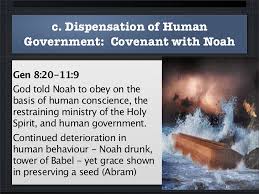If you miss one part of the puzzle that is being put together in these studies, you will never see and understand the whole picture.
A publication of Churches Under Christ Ministry
Previous Lesson:
(2) The Purpose of Gentile Civil Government
Next Lesson:
(4) God Desires that Gentile Nations Glorify Him
Click here to go to all lessons on Civil Government.
Click here to go to links to all written lessons.
Click here to go to the 5 to 8 minute video lectures.
Jerald Finney
Copyright © December 28, 2017
 Would man obey God on the basis of conscience, the restraint of the Holy Spirit, and human government? Man almost immediately failed to govern under God—Noah became drunk and incapable of ruling. Furthermore, Noah’s descendants rebelled against God’s command to populate the whole earth. The pattern has continued with every nation that has ever or will ever exist until Christ returns.
Would man obey God on the basis of conscience, the restraint of the Holy Spirit, and human government? Man almost immediately failed to govern under God—Noah became drunk and incapable of ruling. Furthermore, Noah’s descendants rebelled against God’s command to populate the whole earth. The pattern has continued with every nation that has ever or will ever exist until Christ returns.
Shortly after the flood, God divided the world into nations: “By these were the isles of the Gentiles divided in their lands; every one after his tongue, after their families, in their nations.”[i] God probably did this because if all worldly government were concentrated in one world government, the potential for evil would be unlimited. As attorney John Eidsmoe wrote:
- “Rulers are sinful and given too much authority can become oppressive tyrants. Nations check each other’s power. A one-world government would have no check on its power. No one could check violations on legal limitations and guarantees. World government has the potential for world tyranny.”[ii]
 “The people, instead of obeying God’s command to scatter and fill the earth, conceived the idea of staying together and building the tower of Babel to achieve their aim. Fellowship with man replaced fellowship with God.”[iii] Soon after this division into nations, mankind attempted to build the world’s first “United Nations” building. “And they said, Go to, let us build us a city and a tower, whose top may reach unto heaven; and let us make us a name, lest we be scattered abroad upon the face of the whole earth.”[iv]
“The people, instead of obeying God’s command to scatter and fill the earth, conceived the idea of staying together and building the tower of Babel to achieve their aim. Fellowship with man replaced fellowship with God.”[iii] Soon after this division into nations, mankind attempted to build the world’s first “United Nations” building. “And they said, Go to, let us build us a city and a tower, whose top may reach unto heaven; and let us make us a name, lest we be scattered abroad upon the face of the whole earth.”[iv]
What was wrong with their attempt? “It was a picture of salvation by works, reaching heaven by one’s own efforts; one of its probable purposes was astrology or Satan worship, as with the ziggurat towers in ancient Babylonia; it was based on pride and self-exaltation. In addition, its purpose was to keep the people together in a one-world government instead of spreading them out into national entities as God had intended. The Jewish historian Flavius Josephus, writing shortly after the time of Christ, says: ‘Now it was Nimrod who excited them to such an affront and contempt of God…. He also gradually changed the government into tyranny—seeing no other way of turning them from the fear of God, but to bring them into a constant dependence upon his power. He also said … that he would build the tower too high for the waters to be able to reach and that he would avenge himself on God for destroying their forefathers….’
“As we can read in Genesis 11.5-9, God frustrated the building of the tower by causing the people to speak different languages. God then reaffirmed nationalism: ‘And from thence did the Lord scatter them abroad upon the face of all the earth’ (Genesis 11.9). God further reaffirms nationalism in Deuteronomy 32.9 and Acts 17.26. National entities will continue even during Christ’s millennial rule on earth (Isaiah 2.4; 66.18; Revelation 12.5; 20.3, 8), and perhaps even in heaven (Revelation 21.24, 26).”[v]
Thus, God again judged man for his failure to keep His command to populate the whole earth. God confused their language. Since they could no longer speak the same language, the builders could no longer understand one another. They separated and relocated to different parts of the earth. They began to populate the entire earth. God was giving man another chance for to govern under God according to His precepts for His purposes.
As we have seen, the Bible teaches that God can prevent man from setting up civil government, and He can ordain civil government. He is the Highest Power. At the same time, because God has given man free will, God does not force civil government to operate within the sphere of its God-given authority. All other powers, including all other governments and civil government officials and leaders are under Him, subject to His rules. In Romans we read, “Let every soul be subject unto the higher powers. For there is no power but of God: the powers that be are ordained of God.”[vi] Every soul includes leaders. Then in Romans 13.3-4, God lays out the jurisdiction of civil government consistently with principles for civil government in the Old Testament. Finally, God makes clear that man’s duties under God to civil government are parallel with the jurisdiction of civil government. As always, God declares that God’s children are to obey God rather than man when man’s laws contradict God’s laws.[vii]
God has judged all nations (civil governments) which have ever existed and will judge all nations whom He has not before judged.[viii]
All that God showed man as recorded in the Old Testament failed to convince mankind, excluding a remnant, that God was who He claimed to be, that His rules and principles could not be changed, that judgment falls upon individuals and institutions which do not operate according to His principles. As Isaac Backus observed: “Yet all this [all that God had done in the Garden of Eden, the flood, the ordaining of civil government] did not remove the dreadful distemper from man’s nature, for the great Ruler of the universe directly after the flood gave this as one reason why he would not bring such another while the earth remains, namely, For the imagination of man’s heart is evil from his youth.”[ix] “So that if he was to drown them as often as they deserved it, one deluge must follow another continually.”[x]
Endnotes
[i] Ge. 10.5.
[ii] John Eidsmoe, God and Caesar: Biblical Faith and Political Action (Eugene, Oregon: Wipf and Stack Publishers, 1997) p. 210.
[iii] Charles C. Ryrie, Dispensationalism (Chicago: Moody Press, 1995), p. 53
[iv] Genesis 11.4.
[v] Eidsmoe, God and Caesar, pp. 210-212, citing The Complete Works of Flavius Josephus (Grand Rapids: Kregel, 1974), p. 30.
[vi] Ro. 13.1.
[vii] Ro. 13.5-14 and Ro. 12 and many other Scriptures in both the Old and New Testaments teach that civil government is to deal only with man’s relationship to man, not man’s relationship to God and that man is to obey God rather than men. For a thorough analysis, see Render Unto God the Things that Are His.
[viii] See, e.g., Jer. 25; 30.11; 36.2; Je 46:27-28 look forward to the judgment of the nations.; Da. 5.19; Ps. 72.11; 82.8; Zeph. 1.7 (As in the other Prophets, the approaching invasion of Nebuchadnezzar is treated as an adumbration of the true day of the Lord in which all earth-judgments will culminate, to be followed by the restoration and blessing of Israel and the nations in the kingdom.); Zeph. 3.8-13; Zec. 12.9.
[ix] “An Appeal to the Public for Religious Liberty,” Boston, 1773, an essay of Isaac Backus found in Isaac Backus, Pamphlets on Church, State, and Calvinism: Pamphlets, 1754-1789, Edited by William G. McLoughlin (Cambridge, Mass.: The Belknap Press of Harvard University Press, 1969), p. 310, citing Genesis 4.19; 6.13, 15; 8.21.
[x] Ibid., pp. 310-311.
